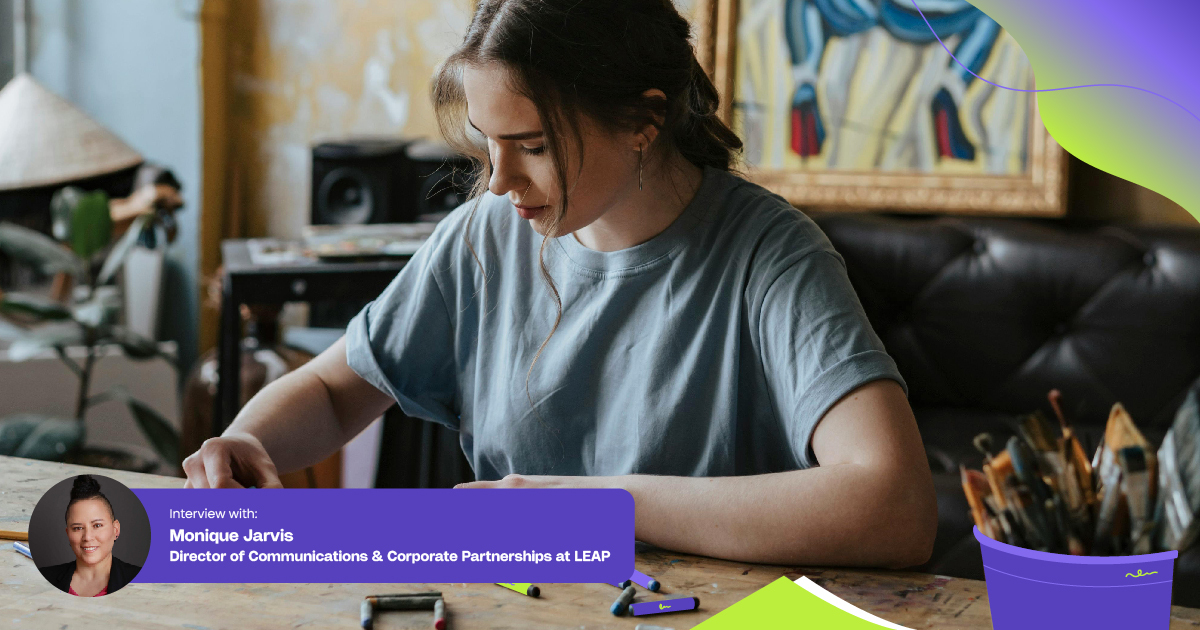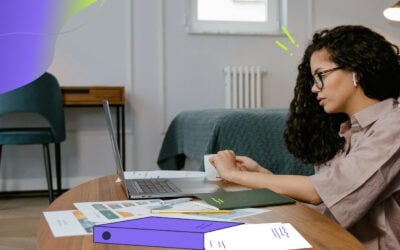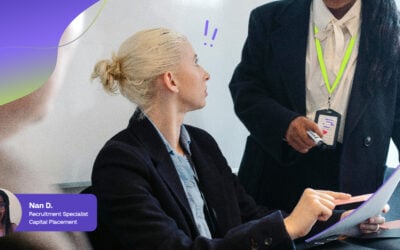
It doesn’t matter if you’re an engineer, a doctor, a poet or a competitive gamer, art has impacted your life and will continue to do so in some way. The content we doom-scroll through for hours, the framed paintings that cover up the gaping crack in the drywall—doesn’t matter what kind of art it is, it’s part of your life for better or worse. Despite its role in our lives, though, people still ask the question “Why is arts education important?”
“If you need a job, they aren’t going to ask you to draw a fruit basket, surely?” Well, firstly, that depends on the job. If you’re applying for a role at a company that exclusively sells portraits of fruit baskets, then this would be inevitable. Secondly, we can’t reduce art or its impacts to such superficial definitions or restrictive circumstances.
Let’s explore the importance of arts education (or art education depending on which side of the pond you’re from) on your career—especially if you’re an intern.
What is arts education?
We’ve covered that we can’t fit art into a box but what exactly is ‘arts education’ and what falls under it?
According to Grantmakers in the Arts’ Glossary of Arts and Education Terms, arts education is “a collective term referring to a comprehensive and sequential education in separate and distinct artistic disciplines, such as dance, music, drama, folk arts, media arts and visual arts.”
Why does it matter? Well, arts education isn’t just about creating pretty pictures or entertaining performances. It helps us develop crucial skills, like critical thinking, creativity, and empathy. It teaches us to appreciate different perspectives and cultures, and it can even improve our problem-solving abilities.
Arts education is all about exploring different forms of art and creativity as part of your learning journey. It’s through this that you’re able to discover new ways to express yourself and understand the world around you.
To understand the true weight of arts education, we spoke to Monique Jarvis, Director of Communications and Corporate Partnerships at LEAP. LEAP is a New York-based nonprofit organisation dedicated to bringing arts-based learning to school communities affected by systemic under-resourcing.
Organisations like LEAP, through their work, highlight the role of quality arts education in providing young people with the tools to thrive in career spaces and to navigate the challenges of systemic inequality and oppression.
Monique’s journey in the arts is deeply rooted in her Afro-Indigenous heritage and her upbringing in a musical family, being a jazz and blues singer herself. Monique developed a profound appreciation for creativity and artistic expression early on when she discovered the transformative power of language and expression.
Let’s get candid about the arts
Arts have long served as a means of expression, reflection, and communication within communities. It famously transcends linguistic, cultural, and socio-economic barriers. The role of the arts in modern society is still one of utmost importance.
However, due to severe underfunding of arts and many believing the myth that arts education is “not useful” for their careers, access to quality education in arts is increasingly rare.
There are many fighting back—and for good reason: if arts education continues to be pushed aside, the very society we live in might become, simply put, unlivable. Children, in particular, may face the largest hurdles due to this. This doesn’t mean you, as an adult, aren’t impacted. As an adult, it remains as important as ever.
Whether it’s your career, how you handle relationships or what hobbies you engage in, it all comes down to the same group of soft skills that are cultivated through arts education.
So, why is arts education important for interns?
Through art—be it music, theatre or literature—people articulate their lived experiences, challenges, and aspirations. It gives you the power to take control of your narrative but it also does much more than that. Here are a few ways in which arts education is important for interns.
Emotional well-being
Arts-based interventions have been shown to enhance socio-emotional well-being. Participation in creative activities fosters self-confidence, self-expression, and emotional regulation.
Creativity
It cultivates creativity, a soft skill that is highly sought after in the workplace. As interns, you’ll encounter tasks and projects that require innovative solutions. Your background in the arts will enable you to think outside the box and bring fresh perspectives to the table.
Empathy
Through your engagement with the arts, you’ve developed an appreciation for different perspectives, cultures, and experiences. This empathy will help you build strong relationships with colleagues and clients, navigate diverse work environments, and contribute to inclusive and collaborative team dynamics during your internships.
Social cohesion/teamwork
The arts promote social cohesion as it puts you in a vulnerable position that requires openness and trust. By collaborating on artistic projects, you forge connections, build trust, and cultivate a shared sense of identity and belonging. For example, when working for a humanitarian or sustainability cause, this is a crucial skill to have.
The sense of solidarity brought through arts often catalyses community-driven initiatives and advocacy efforts aimed at addressing systemic injustices and promoting positive change.
Communication
Through the arts, you honed your ability to express yourself clearly and effectively, whether through visual mediums, performance, or writing. These communication skills will serve you well as an intern, whether you’re presenting ideas to your team, writing reports, or communicating with clients.
Critical thinking
This is another key skill you’ve developed through arts education. In analysing works of art, you’ve learned to think critically about their meaning, context, and impact. This ability to think critically will help you evaluate information, make informed decisions, and solve complex problems during your internship.
Adaptability
In the arts, you’ve likely faced setbacks, encountered unexpected challenges, and had to adapt to changing circumstances. These experiences teach you resilience, the ability to bounce back from setbacks, and the flexibility to adapt to new situations—-skills that will serve you well in turning your internship into a full-time role.
While all of these skills are vital on a personal and professional level, they don’t begin to scratch the surface of how vital arts education is overall for the wellbeing of society. The adverse impacts of a lack of proper arts education can be very serious and lead to detrimental circumstances.
Impact on culturally rich, capable communities that are underserved
For ‘culturally rich, highly capable and vibrant communities’ (the official term) that are impacted by interlocking systems of oppression, arts education is indispensable. They offer a unique avenue for empowerment and self-advocacy, as well as clear pathways for personal and professional development.
Monique’s work at LEAP reflects her commitment to using the arts as a catalyst for social change and empowerment.
“I was an editor for 10 years. I wrote a lot of poetry. I did creative writing workshops. One of my creative writing workshops took place in a maximum security prison. There’s a direct correlation between lack of proficiency in language acquisition in these communities and the school-to-prison pipeline.”
She explained, “Think of it as an algorithm. I’m in third grade, I don’t achieve a certain level of language proficiency by this time. I live in a community that’s vibrant and rich in culture and capability but is under-resourced. My language proficiency is an impediment to my academic and social-emotional growth. Maybe then I get left back. Maybe then I’m targeted for disciplinary action.
“Research does show that Black and brown children tend to be disciplined at higher rates than their counterparts. Maybe I’m that child now. Maybe I’m disinterested … But then I become persistently disengaged and eventually, I engage in truancy. There’s a direct correlation between truancy and criminal activity. I get suspended because of the increase in disciplinary actions because of my disengagement. Maybe I’m acting out in class. I’m walking the hallways.
“Then there’s what’s called pushout. Pushout means that I’m just not motivated and incentivised to go to school. Maybe other options are being made available to me in the communities where I live that are not school-related.”
All of this could culminate in unfortunate situations down the road as these children are pushed further away from beneficial routes early on.
“As an editor of an African American newspaper and having a basic understanding of this trajectory of the school-to-prison pipeline, it inspired me to do what I can to make a change … I started doing workshops and speaking at alternative incarceration centres and maximum security prisons … My first time at the maximum security prison, I walked in and saw what I believe to be the largest gathering of Black and brown people.
“It was a men’s prison and I was in shock. I wasn’t prepared. Maybe I didn’t do my homework—very idealistic, very naive at that time,” Monique shared. “I couldn’t speak because I realised I was looking at generations of dispossessed, disenfranchised people who look like me … It was at that pivotal moment that I realised that I needed to take the talents and the gifts that I’d been blessed with and I needed to be about the business of disrupting that prison-to-school pipeline.”
These communities are historically marginalised voices. “Art can help to undo that. Art can help to elevate those marginalised voices. We know that there are kids who are facing unique circumstances and may show persistent disengagement in school. Art can help them and we know this for a fact. Our (LEAP’s) research shows us this and external research shows us this. Art can engage that student.”
Outside of the research that LEAP does internally, they also partner with a national firm, Hello Insight, measuring the impact of their unique pedagogical approach to bringing arts to classrooms.
Final thoughts
For starters, even in 2024, arts education continues to receive a little less attention than it deserves. Supporting quality arts education for all is essential for the overall development of society. It fosters cultural appreciation, promotes diversity, and encourages civic engagement, ultimately enriching the fabric of society as a whole. Now more than ever, we need to find ways to connect and humanise one another.
For interns specifically, quality arts education offers valuable soft skills that enhance your performance in the workplace. By providing people with access to arts education, we’re equipping them with indispensable skills such as creativity, critical thinking, and emotional intelligence, which leads to personal and professional lives. They help you contribute positively to your team and navigate challenges in the workspace with confidence and resilience.
Want your career to have the best start in 2024? Book a call with us, let’s talk about it. You can also subscribe to our newsletter for the latest career information, tips, and updates. (They’re both completely free!)



